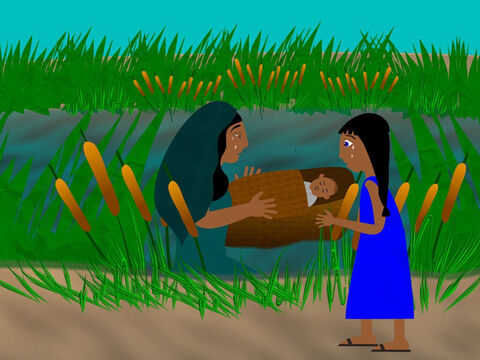[For articles on the “Sabbath of SHMOT" in Hebrew, click here]
Updated on January 10, 2023Rabbi Dr. Yossi Feintuch was born in Afula and holds a Ph.D. in American history from Emory University in Atlanta. He taught American history at Ben-Gurion University.
Author of the book US Policy on Jerusalem.
He is the rabbi of Congregation Shalom Bayit in Bend, Oregon.
* * *
The profound magnitude of Jocehbed's hiding her three-month-young (nameless*) baby son in a water-proof basket, and laying "it in the flags by the [Nile] river's brink'' (Exodus 2:3) may be evidenced in other biblical instances where mothers were willing to forsake their actual motherhood so their child shall live. Let us first turn to Rebecca to whom the holy spirit -- as Rashi has it -- conveyed Esau's intent to kill Jacob -- at the ''right'' timing -- for deceiving him out of Isaac's birthright blessing. Thereupon Rebecca ordered her son, Jacob, to flee for his life to her brother Laban in Haran ''and tarry with him a few days'' until Esau's fury cooled off; ''then I will send, and fetch you from there''. Now, since Rebecca, we assume, had at least an inkling about the future she was able to foresee that Jacob would not be back after a short sojourn in her birthplace; indeed, that he would be gone from her life for good.
Thus, when Jacob did return to Canaan two decades later, Rebecca's assurance of ''a few days'' hiatus -- possibly, her way to convince her son to leave at once -- did not only materialize; she herself was no longer alive. Given Rebecca's sustained ability to dialogue with the ''holy spirit'' (a mysterious connection to a divine oracle), it is plausible to presume that Rebecca had known from the getgo that she would no longer see Jacob after his departure. Yet, saving his life from Esau's would-be attempt to kill him was the only thing that mattered to her. Rebecca practically conceded her motherly future presence in Jacob's life, so he will live, away from Esau but from her too.
Another mother shielding her son from the throes of death is one of the two harlots, both of whom had just given birth in the same house that they shared; they came before King Solomon in Jerusalem to decide who among the two was the mother of the one baby who lived through his first night, and who of the two mothers lost her baby during that night. Each of the two mothers argued before the Israelite monarch that she was the real mother of the living baby boy, and that the dead one belonged to the other. In the absence of witnesses who would testify and aid King Solomon in meting out a just verdict, the king decided that the living baby should be cut lengthwise, with each pleading mother to ''receive'' one half of the child.
It was then that the living baby's real mother, out of motherly love and compassion for her baby, appealed to the king to hand over her own living baby to her antagonist. This radical selfless sacrifice of her maternity meant that another woman, even if her malicious co-litigant, would raise her child, rather than see him cut down according to the king's sentence. When the other woman embraced the king's original decision, Solomon knew who the real mother was and had her child handed over to her.
Which brings us back to Jochebed, another Israelite mother who is willing to sacrifice her own motherhood as long as her child will live. Indeed, that was Jochebed's very intent when she no longer was able to hide him after his third month, and thus protect him from the Pharaoh's decree to his people to cast every Hebrew baby boy into the river. She, therefore, made a buoyant basket and placed her baby in it. Jochebed hoped that in leaving her son by the bulrushes near the Nile's bank he would be discovered by an Egyptian who might adopt and raise him as her own child; as an Egyptian that is, even if not as a Hebrew. (This enormous dilemma would be experienced by many Jewish parents of young children in Poland during World War 2, prior to their expulsion to a ghetto, whether to deposit their children with nunneries and monasteries, knowing that if they did not return to claim their children they would be lost to the Jewish people though they will live.)
Indeed, given Moses' authentic Egyptian name (Mose, i.e., ''one who is born'' and hence ''son'', as Robert Alter posits) given to him by his adoptive mother, as well as Moses' later overall self-identification as an Egyptian (alluded to in Exodus 2:19, 22), the immensity of Jochebed's selfless radical solution is self-evident -- let my child live even if raised by an Egyptian.
[For articles on the “Sabbath of SHMOT" in Hebrew, click here]
*And that is why Jochebed did not name her baby for she was preparing herself mentally to part from him; naming her son would make the separation enormously harder, even if such a name would be superseded by the child's adoptive mother.








